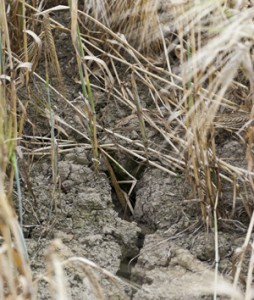Climate change and woodland management
Our native tree species have adapted to their local climate, atmosphere and soil conditions over many years. They have long life cycles and may take many years to reach maturity and seed bearing age. This leads to an inherently slow genetic response to changing climatic conditions. Because of this vulnerability it is worth considering how woodlands could be better managed for the future impacts of climate change.
Firstly, how will the climate change in our area? Predictions for the UK are for a generally milder climate. Summers are expected to be warmer and dryer with more frequent droughts, winters being milder and wetter with less frequent frosts. We need to consider how our woodlands might adapt to these conditions.
Different management objectives - such as timber production, amenity use or retention of semi-natural woodland - will also need to be considered in the context of climate change, resulting in different planting and management actions. Difficulty in woodland management also lies with ensuring that decisions made now are appropriate to both the current and the future climatic conditions. The current practice of using planting stock of local provenance (stock that has been propagated from seed collected from trees native to the locality) is considered important for the maintenance of local genetic variety. However, this practice also assumes that the trees will be adapted to the local environmental conditions – perhaps an unreliable assumption in the face of predicted climate change. Hence, there is strong argument to review the practice of using solely local provenance planting stock and to now make planting schedules more flexible.
With these factors in mind, as a general guide when planning the planting of new woodland, it is worth considering a broad mix of tree species including both broadleaf and coniferous trees, and planting a mixture of local and as well as non-native provenance perhaps including trees of a more southerly provenance in the planting plan. This is of particular importance in the south of England where survival of some  species will be limited by drought conditions. This practice should give the woodland a better chance of adaptation to the changing conditions. In addition, growth rates across the north and west of the UK are predicted to rise with both higher temperatures and atmospheric CO2 levels. This may lead to the need to review management practices by adjusting the timing of operations such as rotation and thinning to come in line with this increased productivity.
species will be limited by drought conditions. This practice should give the woodland a better chance of adaptation to the changing conditions. In addition, growth rates across the north and west of the UK are predicted to rise with both higher temperatures and atmospheric CO2 levels. This may lead to the need to review management practices by adjusting the timing of operations such as rotation and thinning to come in line with this increased productivity.
To conclude, this is obviously a very complex subject and it is difficult to accurately predict future changes in the climate and even more so their effects on the success and survival of tree species in that changed environment. However, general predictions can be made and research is bringing new information to light all the time. In general, woodlands of mixed species and some variability in provenance will provide better insurance against the current uncertainty in their response to the changing climate and these factors should be built into future woodland management strategies.
More detail of these issues can be found in the Forestry Commission Information Note - Broadmeadow, M. and Ray, D. (2005). Climate Change and British Woodland. ISBN 0-85538-658-4.
www.forestry.gov.uk/PDF/fcin069.pdf/$FILE/fcin069.pdf
Also of interest - Broadmeadow, M. Climate change - Impacts on UK forests. Forestry Commission Bulletin 125.
www.forestresearch.gov.uk/fr/infd-5zyhmc
Comments are closed for this post.
Discussion
Climate change is quite on the rise these days, so be prepared for more weather disasters,”;
it is very evident that climate change is already taking effect in this decade.`:
Climate Change is really scary, now we have super typhoons and a lot of flooding going on some countries..,’~
Interesting paper “Impacts on woodland ecology” by Keith Kirby on the RHS website. One of the contributions to the Trees in a Changing Climate Conference in 2005
http://www.rhs.org.uk/research/climate_change/trees_conference.asp

[…] have significant effects on our wildlife – both plant and animal (as indicated in Rob’s recent blog). It is likely that not only will our plants and animal species change over time, but their range […]
Our Changing Weather | Woodlands.co.uk
30 April, 2013